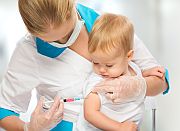When parents learn about the harms of measles, mumps, and rubella, many change their stance
TUESDAY, Aug. 4, 2015 (HealthDay News) — Highlighting what might happen if children aren’t vaccinated can change the thinking of some people who oppose vaccines, according to research published online Aug. 3 in the Proceedings of the National Academy of Sciences.
Many people with anti-vaccine views focus on the perceived risks of vaccines, the researchers noted. “Perhaps we need to direct people’s attention to the other aspect of the decision. You may be focused on the risk of getting the vaccine. But there’s also the risk of not getting the vaccine. You or your child could get measles,” University of Illinois graduate student Zachary Horne said in a university news release.
Horne and his colleagues asked 315 people their views about vaccines and their willingness to vaccinate their children. Then they randomly divided them into three groups. One group received material challenging the anti-vaccination point of view, and another group got reading material and photographs about the risks associated with measles, mumps, and rubella in children. The third group read about something other than vaccines. All three groups then completed another survey about vaccination.
“We found that directing people’s attention to the risks posed by not getting vaccinated, like getting measles, mumps, and rubella and the complications associated with those diseases, changed people’s attitudes positively towards vaccination — and that was for even the most skeptical participants in the study. Actually, the largest effect sizes were for people who were the most skeptical,” Horne said.
Copyright © 2015 HealthDay. All rights reserved.








